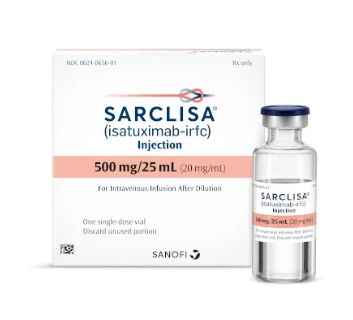Sanofi's Sarclisa (isatuximab) might gain an expanded indication as the first anti-CD38 antibody treatment for first-line multiple myeloma (MM) patients ineligible for transplantation, in combination with bortezomib/lenalidomide/dexamethasone (VRd).

The U.S. Food and Drug Administration (FDA) recently accepted the isatuximab/bortezomib/lenalidomide/dexamethasone (Isa-VRd) four-drug regimen for accelerated review for treating newly diagnosed multiple myeloma patients ineligible for transplantation.
If approved, Sarclisa will be the first anti-CD38 therapy available in combination with the existing standard of care, VRd, in newly diagnosed patients not subject to transplants.
The application was submitted based on results from Sarclisa's phase 3 IMROZ study, which Sanofi announced last December with an interim analysis showing that “the Isa-VRd regimen met its primary endpoint with a significant improvement in progression-free survival (PFS) compared to the VRd regimen.”
The IMROZ study is the fourth phase 3 clinical study to demonstrate the superiority of the addition of Sarclisa to the existing standard of care, VRd, and carfilzomib/lenalidomide/dexamethasone (KRd), in newly diagnosed multiple myeloma patients, reinforcing Sarclisa's best-in-class potential.
Specific IMROZ study results will be presented at the American Society of Clinical Oncology’s annual meeting (ASCO 2024), which opens on Friday, followed by the European Hematology Association’s annual meeting (EHA 2024) on June 13.
If approved, this expansion will add a third indication for Sarclisa's Isa-Pd triple therapy for relapsed or refractory multiple myeloma to the Isa-Pd triple therapy and Isa-Kd triple therapy for relapsed or refractory multiple myeloma.
In particular, except for the combination with pomalidomide/dexamethasone (Pd), Sarclisa is expanding indications differently from the original anti-CD38 antibody, Darzalex (daratumumab), and it will be noteworthy to see whether this blue ocean strategy will lead to an overall market expansion, industry sources said.
In Korea, however, Sarclisa has not been launched for more than three and a half years after receiving approval from the Ministry of Food and Drug Safety (MFDS).
Sanofi received approval for Sarclisa in December 2020 for “combination therapy with pomalidomide and dexamethasone in patients with multiple myeloma who have received two or more prior therapies, including lenalidomide and a proteasome inhibitor.”
However, the company has reportedly abandoned its launch in Korea.
Sanofi's decision to abandon Sarclisa’s launch in Korea was due largely to Darzalex's difficulties getting reimbursement, according to myeloma experts.
Darzalex, which was first approved by the MFDS in 2017, has since expanded its indications and improved dosing to become a standard of care for multiple myeloma, but it is still not covered by insurance for most indications.
As Sarclisa’s indication expansion continues, Korean patients will inevitably have limited treatment options, the experts said.
“Currently, isatuximab is used in various combination therapies with daratumumab overseas, but it is not available in Korea because it is not imported,” said Professor Yoon Dok-hyun of the Department of Oncology at Asan Medical Center. “There are combination therapies that can be used independently of daratumumab, and as a result, Korean patients have fewer treatment options than their foreign counterparts.”
Related articles
- Antengene's Xpovio moves close to getting insurance benefits
- New research offers hope in multiple myeloma treatment through enhanced NK cell function
- Darzalex’s reimbursement has been in limbo for 3 years. Will it be different this time?
- Patient support group, physicians fight multiple myeloma together
- Pfizer’s multiple myeloma drug Elrexfio gets approval in Korea
- [Photo News] Leading pharma giants unveil cutting-edge oncology research at ASCO 2024
- Newborn screening for lysosomal storage disorders expanded in Korea
- ‘DKd combination highly effective in lenalidomide-exposed patients’
- New blood cancer drugs reach Korea but insurance delays hinder survival rates: expert
- Sanofi’s high-dose vaccine targets flu vulnerabilities in older adults

